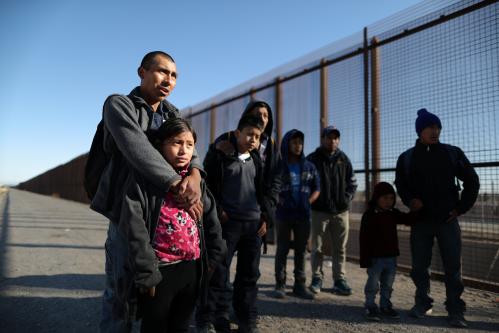It is an outdated notion that people from El Salvador, Guatemala, and Honduras are primarily looking for economic opportunity in the United States and, therefore, should wait in line for a visa. For people fleeing these countries, waiting for a visa can result in death, rape, or forcible recruitment into crime.
A recent report from Doctors Without Borders (MSF) states that these Northern Triangle countries are experiencing “unprecedented levels of violence outside a war zone” and that “citizens are murdered with impunity, kidnappings and extortion are daily occurrences. Non-state actors perpetuate insecurity and forcibly recruit individuals into their ranks, and use sexual violence as a tool of intimidation and control.”
These countries rank in the top 10 in the world for homicide. White House Chief of Staff John Kelly, as leader of U.S. Southern Command in 2014, said that cartels and gangs, fueled by the U.S. demand for drugs, “have left near-broken societies in their wake.”
The U.S. government argues that people fleeing these places do not fit the technical definition of a refugee, so the U.S. is not obligated to offer them asylum. Yet they fit the spirit of agreements on refugees adopted after World War II. The U.N. refugee agency has concluded “that a significant percentage of those fleeing… may be in need of international protection, in line with the 1951 Convention relating to the Status of Refugees.”
Under current U.S. policy, most individuals from Northern Triangle countries are subject to deportation. The Obama administration stepped up enforcement following the 2014 surge in unaccompanied minors, in an attempt to deter future arrivals. The Trump administration has recently implemented an even tougher stance. MSF calls these policies “a death sentence for Central Americans fleeing violence.” There are documented cases of individuals being murdered in their home country after being deported by the U.S.
Evidence confirms it’s not just economics
Activists and media have been reporting on the situation for years. There have always been migrants—documented and undocumented—crossing the U.S. southern border. Many of them come for economic reasons. But the current flow is different. In 2016, 42 percent of people apprehended at the U.S. southern border came from Northern Triangle countries, compared to 13 percent in 2010. While economic incentives are still a push factor, the United States Conference of Catholic Bishops concludes that generalized violence “has played a decisive and forceful role” for recent arrivals.
MSF surveyed people in Mexico from Northern Triangle countries in 2015. Thirty-nine percent of respondents cite attacks or threats to themselves or family as the reason for leaving. More than 40 percent had a relative who was killed in the past two years. Thirty-one percent knew someone who was kidnapped; 17 percent knew someone who disappeared. Michael Clemens examines the relative strength of violence and economics driving unaccompanied minors from the Northern Triangle into the U.S.: Controlling for economic factors, a sustained increase of one homicide per year in an area caused approximately 0.9 additional apprehensions of unaccompanied minors per year in the U.S. from that area.
Former Secretary of State Rex Tillerson argued that U.S. demand for drugs drives violence and lawlessness in Northern Triangle countries. In a 2017 speech, then Secretary of Homeland Security John Kelly argued, “The reason for the drug flow is due to our drug demand and we do almost nothing about it.” Arms trafficked from the U.S. also contribute to the violence. Almost half of unregistered weapons seized in Honduras came from the U.S. The region also has stockpiles of weapons from civil conflict during the Cold War, many provided by the U.S. and Soviet Union.
Mexico is not a safe haven
Safety concerns cause many fleeing violence from the Northern Triangle to pass through Mexico en route to the U.S., rather than seeking protection there. Of individuals from these countries surveyed by MSF while transiting Mexico, 68 percent reported being victims of violence during their trip and nearly one-third of women had been sexually assaulted. Perpetrators include gang members and Mexican security forces. Twelve of the world’s 50 most violent cities are in Mexico.
A kinder reception would be more effective
Many policymakers talk about arrivals from the Northern Triangle as if they are economic migrants. The news media often fails to distinguish between motivations. Failure to recognize the nature of the crisis leads to inhumane and ineffective policies.
U.S. lawmakers call for tougher policies to deter arrivals. But strict—even cruel—measures at our border will not stop those fleeing for their lives. If the violent route through Mexico is not a deterrent, it is unlikely that U.S. policy will be one. With tougher border rules, people fleeing violence are more likely to use traffickers and to pay higher prices, thus providing more resources that strengthen organized criminal groups.
The International Crisis Group, Doctors Without Borders, and the U.N. refugee agency have called for host countries to provide protection instead of repatriation. This would reduce the need to use traffickers to enter the U.S. illegally, keep people out of the shadows, and allow host governments to manage the flow of refugees. The vast majority of those detained at the border from Northern Triangle countries are not gang members, but innocent people fleeing violence. Screening and security precautions can be used to vet arrivals.
In 2016, the U.S. government detained 224,854 people from El Salvador, Guatemala, and Honduras —less than one-tenth of 1 percent of the U.S. population. If they were allowed to stay, and even if the rate were maintained for a decade, it would still be a much smaller share of the U.S. population than previous waves of Irish, Italians, and Russian Jews. These groups were also greeted with suspicion, but now few would deny their value as Americans. Far from being an economic drain, refugees contribute to the economy, driven to succeed and often innovative.
Some policymakers argue that it is a security threat to accept people from violent countries. Security was the excuse for not admitting those fleeing violence in Germany before and during World War II. Afterward we agreed it was unacceptably cruel. Asylum seekers always come from places where there are “bad hombres.” That is why they flee.
The Brookings Institution is committed to quality, independence, and impact.
We are supported by a diverse array of funders. In line with our values and policies, each Brookings publication represents the sole views of its author(s).






Commentary
Violence drives immigration from Central America
June 26, 2018